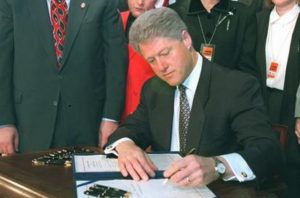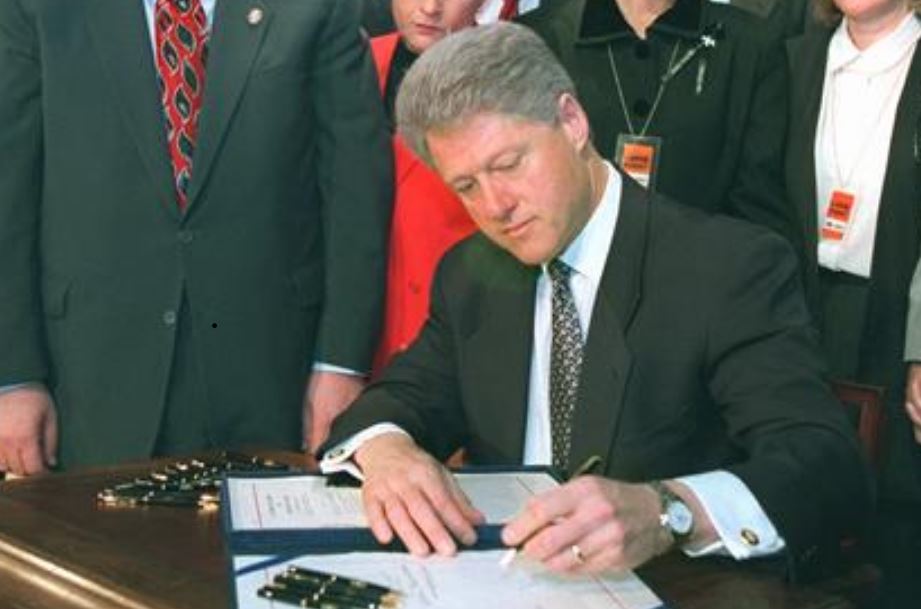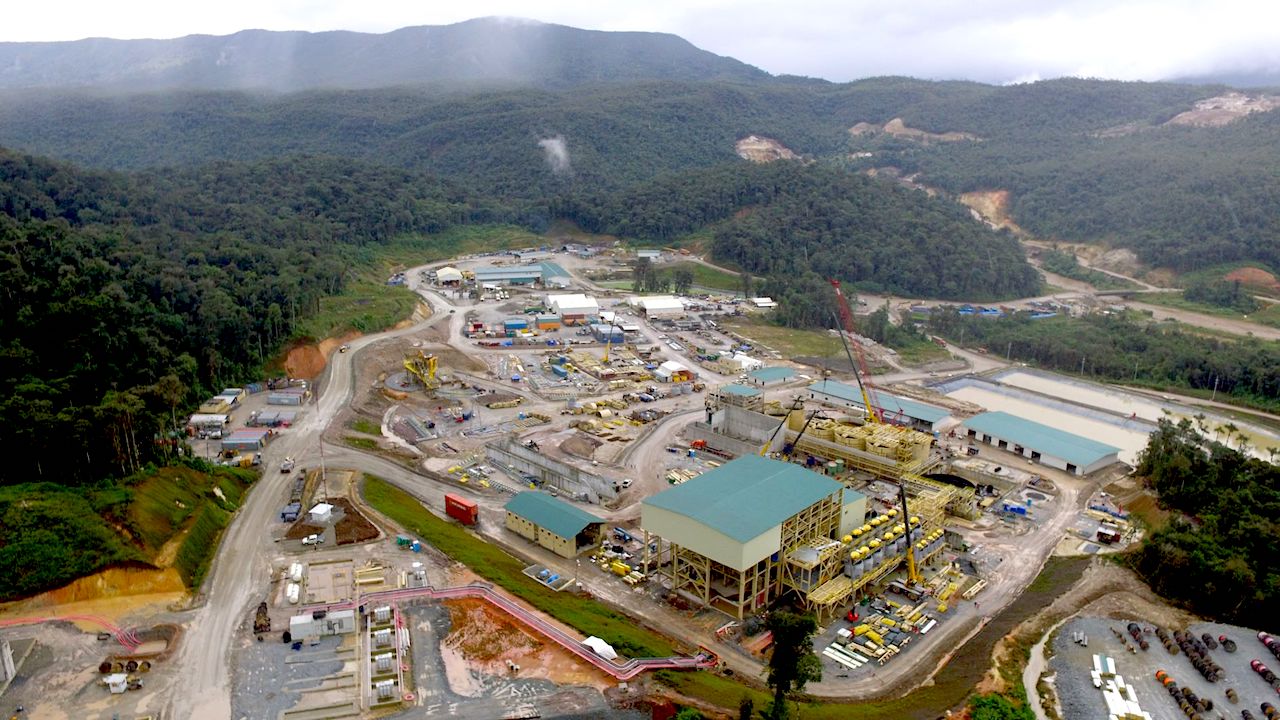[caption id="attachment_1003728312" align="aligncenter" width="433"]
 Then-President Bill Clinton signed the Helms-Burton Act into law in 1996. (Image: Reuters)
Then-President Bill Clinton signed the Helms-Burton Act into law in 1996. (Image: Reuters)[/caption]
In a reversal of long standing U.S. policy, any person or entity with business operations or relationships in Cuba may soon face civil liability in the United States.
On April 17, 2019, the Trump administration announced that it would not extend the suspension of the right to bring an action under Title III of the
Cuban Liberty and Democratic Solidarity (LIBERTAD) Act of 1996, better known as the Helms-Burton Act, beyond the end of the existing suspensions on May 1, 2019.
Following the expiry of the existing suspensions, any person who "traffics" in property that was confiscated by the Cuban government on or after Jan. 1, 1959, may face liability for the full value of the confiscated property, in some cases times three.
The definition of trafficking under Title III is very broad, and includes engaging in commercial activity using or otherwise benefitting from confiscated property; among other things, this could include using landing strips at airports, leasing hotels, and holding docking rights in ports. Actions under Title III of Helms-Burton may be brought within two years after the trafficking giving rise to the action has ceased to occur.
High Potential for Recovery in U.S.
The right to bring an action under Title III of Helms-Burton
had been continuously suspended by U.S. presidential administrations for successive six-month periods since 1996. The Trump administration began reducing the suspension periods in early 2019, with the latest suspension through May 1, 2019, being for only two weeks. Moreover, the most recent two suspensions included exceptions that allowed claims to proceed for the first time against certain entities, being those under the control of Cuban military, intelligence and security services on the U.S. State Department's Cuba Restricted List.
Now that the general right to bring an action under Title III of Helms-Burton
will take effect as of May 2, 2019, much uncertainty lies ahead. While the boundaries of liability under Helms-Burton
remain to be determined by the courts, U.S. plaintiff law firms are likely to aggressively pursue these claims due to high potential recovery under the act.
Canadian Protections Against Helms-Burton
Canadian law affords certain protections in response to Helms-Burton. Under Canada's
Foreign Extraterritorial Measures Act (FEMA), Helms-Burton
judgments may not be recognized or enforced in Canadian courts. Moreover, FEMA
allows Canadians to counter-sue for losses sustained in relation to Helms-Burton
actions and judgments with the support of the Attorney General. FEMA
may also protect against disclosure of records in Canada for use in Helms-Burton
proceedings.
Canadians who have business operations in Cuba or relationships with Cuban entities should immediately contact Canadian legal counsel to assess their exposure and discuss strategies for mitigating potential liability.
The authors are lawyers at Bennett Jones LLP at www.BennettJones.com. 
 Then-President Bill Clinton signed the Helms-Burton Act into law in 1996. (Image: Reuters)[/caption]
In a reversal of long standing U.S. policy, any person or entity with business operations or relationships in Cuba may soon face civil liability in the United States.
On April 17, 2019, the Trump administration announced that it would not extend the suspension of the right to bring an action under Title III of the Cuban Liberty and Democratic Solidarity (LIBERTAD) Act of 1996, better known as the Helms-Burton Act, beyond the end of the existing suspensions on May 1, 2019.
Following the expiry of the existing suspensions, any person who "traffics" in property that was confiscated by the Cuban government on or after Jan. 1, 1959, may face liability for the full value of the confiscated property, in some cases times three.
The definition of trafficking under Title III is very broad, and includes engaging in commercial activity using or otherwise benefitting from confiscated property; among other things, this could include using landing strips at airports, leasing hotels, and holding docking rights in ports. Actions under Title III of Helms-Burton may be brought within two years after the trafficking giving rise to the action has ceased to occur.
High Potential for Recovery in U.S.
The right to bring an action under Title III of Helms-Burton had been continuously suspended by U.S. presidential administrations for successive six-month periods since 1996. The Trump administration began reducing the suspension periods in early 2019, with the latest suspension through May 1, 2019, being for only two weeks. Moreover, the most recent two suspensions included exceptions that allowed claims to proceed for the first time against certain entities, being those under the control of Cuban military, intelligence and security services on the U.S. State Department's Cuba Restricted List.
Now that the general right to bring an action under Title III of Helms-Burton will take effect as of May 2, 2019, much uncertainty lies ahead. While the boundaries of liability under Helms-Burton remain to be determined by the courts, U.S. plaintiff law firms are likely to aggressively pursue these claims due to high potential recovery under the act.
Canadian Protections Against Helms-Burton
Canadian law affords certain protections in response to Helms-Burton. Under Canada's Foreign Extraterritorial Measures Act (FEMA), Helms-Burton judgments may not be recognized or enforced in Canadian courts. Moreover, FEMA allows Canadians to counter-sue for losses sustained in relation to Helms-Burton actions and judgments with the support of the Attorney General. FEMA may also protect against disclosure of records in Canada for use in Helms-Burton proceedings.
Canadians who have business operations in Cuba or relationships with Cuban entities should immediately contact Canadian legal counsel to assess their exposure and discuss strategies for mitigating potential liability.
Then-President Bill Clinton signed the Helms-Burton Act into law in 1996. (Image: Reuters)[/caption]
In a reversal of long standing U.S. policy, any person or entity with business operations or relationships in Cuba may soon face civil liability in the United States.
On April 17, 2019, the Trump administration announced that it would not extend the suspension of the right to bring an action under Title III of the Cuban Liberty and Democratic Solidarity (LIBERTAD) Act of 1996, better known as the Helms-Burton Act, beyond the end of the existing suspensions on May 1, 2019.
Following the expiry of the existing suspensions, any person who "traffics" in property that was confiscated by the Cuban government on or after Jan. 1, 1959, may face liability for the full value of the confiscated property, in some cases times three.
The definition of trafficking under Title III is very broad, and includes engaging in commercial activity using or otherwise benefitting from confiscated property; among other things, this could include using landing strips at airports, leasing hotels, and holding docking rights in ports. Actions under Title III of Helms-Burton may be brought within two years after the trafficking giving rise to the action has ceased to occur.
High Potential for Recovery in U.S.
The right to bring an action under Title III of Helms-Burton had been continuously suspended by U.S. presidential administrations for successive six-month periods since 1996. The Trump administration began reducing the suspension periods in early 2019, with the latest suspension through May 1, 2019, being for only two weeks. Moreover, the most recent two suspensions included exceptions that allowed claims to proceed for the first time against certain entities, being those under the control of Cuban military, intelligence and security services on the U.S. State Department's Cuba Restricted List.
Now that the general right to bring an action under Title III of Helms-Burton will take effect as of May 2, 2019, much uncertainty lies ahead. While the boundaries of liability under Helms-Burton remain to be determined by the courts, U.S. plaintiff law firms are likely to aggressively pursue these claims due to high potential recovery under the act.
Canadian Protections Against Helms-Burton
Canadian law affords certain protections in response to Helms-Burton. Under Canada's Foreign Extraterritorial Measures Act (FEMA), Helms-Burton judgments may not be recognized or enforced in Canadian courts. Moreover, FEMA allows Canadians to counter-sue for losses sustained in relation to Helms-Burton actions and judgments with the support of the Attorney General. FEMA may also protect against disclosure of records in Canada for use in Helms-Burton proceedings.
Canadians who have business operations in Cuba or relationships with Cuban entities should immediately contact Canadian legal counsel to assess their exposure and discuss strategies for mitigating potential liability.





Comments